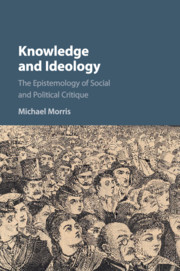Book contents
- Frontmatter
- Dedication
- Contents
- Acknowledgments
- Introduction
- Part I The Dialectic of Ideology
- Part II On Ideology and Violence
- Part III A Marxist Theory of Knowledge
- 6 German Visions of the French Revolution: On the Interpretation of Dreams
- 7 The Social Crisis and the Vocation of Reason: Mannheim as Epistemologist
- 8 Practice, Reflection, Sublimation, Critique: Social Ontology and Social Knowledge
- Bibliography
- Index
8 - Practice, Reflection, Sublimation, Critique: Social Ontology and Social Knowledge
from Part III - A Marxist Theory of Knowledge
Published online by Cambridge University Press: 17 November 2016
- Frontmatter
- Dedication
- Contents
- Acknowledgments
- Introduction
- Part I The Dialectic of Ideology
- Part II On Ideology and Violence
- Part III A Marxist Theory of Knowledge
- 6 German Visions of the French Revolution: On the Interpretation of Dreams
- 7 The Social Crisis and the Vocation of Reason: Mannheim as Epistemologist
- 8 Practice, Reflection, Sublimation, Critique: Social Ontology and Social Knowledge
- Bibliography
- Index
Summary
Interested Knowledge and the Possibility of Rational Consensus
Mannheim asserts that all social knowledge claims reveal the influence of sociohistorical interests, and he then concludes that we must reconceive social knowledge itself as inherently and rightly interested. This conclusion has elicited many criticisms. First, as we have already seen, numerous critics argue that Mannheim fails to recognize the merely descriptive status of the psychological and sociological studies that document the role of interest in the formation and acceptance of existing beliefs. These critics insist that empirical disciplines must be carefully distinguished from epistemology, which describes how thought ought to function. They chastise Mannheim for failing to observe this basic distinction. They accuse him of ascribing inherent normative import to studies that are merely descriptive.
Mannheim has an effective and relatively definitive response to these critics: epistemology always emerges as an observational reflection upon existing cognitive practices. The normative claims of epistemology do not derive from some pure a priori realm, from some special kind of introspective investigation into the nature of reason, representation, or language. Instead, they derive from our awareness of existing cases of knowing. Mannheim further argues that our cognitive practices can never be accurately captured in the traditional categories of the empirical sciences. Accurate descriptions of social practices are never merely descriptive, they are also always normative. They necessarily take some stance regarding the nature of the aim that the practice strives to instantiate, the aims toward which it incompletely gestures. In attempting to capture what the practice is, they must take some position on what it ought to be. With regard to specifically cognitive practices, this reciprocal relation between is and ought, between current practice and intended aim, implies that the content of concepts such as “truth,” “reality,” and “knowledge” derive largely from the practices that more or less adequately gesture toward these cognitive ends.
Epistemology always derives from the careful study of actually existing and relatively successful practices. Therefore, insofar as it derives its orientation and content from the careful study of existing cognitive practices, Mannheim's sociology of knowledge does not diverge from traditional epistemology. It does however diverge from traditional epistemology in its insistence that certain pervasively interested, relatively local, and highly contested cognitive practices might nonetheless count as moderately coherent and tolerably successful.
- Type
- Chapter
- Information
- Knowledge and IdeologyThe Epistemology of Social and Political Critique, pp. 240 - 290Publisher: Cambridge University PressPrint publication year: 2016

